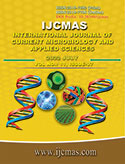


 National Academy of Agricultural Sciences (NAAS)
National Academy of Agricultural Sciences (NAAS)

|
PRINT ISSN : 2319-7692
Online ISSN : 2319-7706 Issues : 12 per year Publisher : Excellent Publishers Email : editorijcmas@gmail.com / submit@ijcmas.com Editor-in-chief: Dr.M.Prakash Index Copernicus ICV 2018: 95.39 NAAS RATING 2020: 5.38 |
Phosphorus (P) is one of the most vital macronutrient required for the growth and development of plant. Although P may be present in high concentration in most soils. It is mostly not plant available form. Phosphorus Solubilizing Microorganism (PSM) present in the rhizosphere play a role in increasing the bioavailability of soil phosphate for plant through solubilzation and mineralization. The present study aimed at isolating and analysing PSM from different rhizospheres and testing isolates on growth of sorghum plant at different concentration levels with the future prospect of formulating the potential biofertilizers. A total number of 35 samples in five replicate were randomly collected from rhizosphere soil of of wamba, Doma, Awe, Lafia, Akwanga, Obi and Nasarawa-Eggon in Nasarawa State. PSM were isolated by spread plate technique using Pikovskaya’s medium (PVK) and further identified using appropriate biochemical test. Quantitative and qualitative methods was used to evaluate the phosphate solubilization potency of isolates by employing the PVK with supplementation of bromophenol blue and liquid assay by chlorostannous reduced molybdophosphoric acid method. A pot trial experiment using polyethene bags was conducted to determine the activity of the isolated PSM on growth of sorghum plant. A total number of 22 microbial isolates with halo zone of phosphate solubilization more than 5mm were isolated from the various rhizosphere soils samples. Among the isolates, 5 showed relative potency to solubilize the inorganic phosphate and were selected for further studies. All of the 5 isolates showed variation in the quality and quantity efficiency to solubilize phosphate ranged from 1.15cm to 2.25cm qualitatively and from 0.517 mg/l to 0.764 mg/l quantitatively. The isolates Pseudomonas spp, and Bacillus spp, were most potent for their qualitative and quantitative activities to solubilize the inorganic phosphate, ranged from 2.25cm and 2.17cm and 0.764 mg/l and 0.626 mg/l. Further analyses for physiological optimization of PSM indicates maximum growth and P solubilization activity on PVK broth at temperature range of 30-35 oC for bacteria and 25-30 oC for fungi and pH at 6-7 for all PSM. The pot experiment showed that application of PSM on sorghum plant significantly improved plant height, numbers of leaves, root length and dry root weight. Inoculation using Pseudomonas spp increased plant growth the best when compared to other inoculants. Aspergillus spp had the least effect on the growth of sorghum in all measured parameters. All inoculants showed a high phosphate solubilizing abilities at a concentration of 50mLkg-1 and 25mLkg-1. The result showed that there was significant difference at (0.05) confidence limit in all treatment levels (<0.05). The present study indicated that the use of PSM is considered a sound eco-friendly and cost effective strategy in improving the productivity of sorghum and other crops.
 |
 |
 |
 |
 |